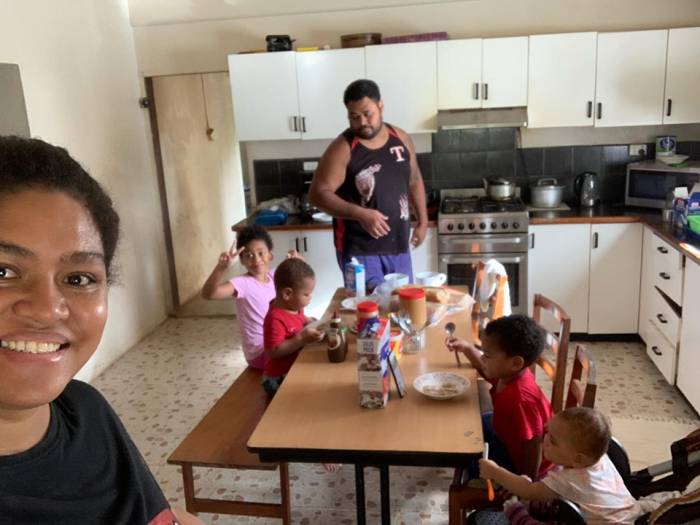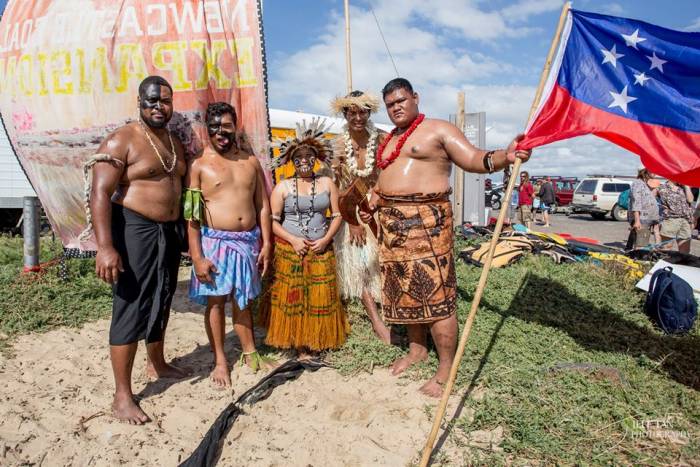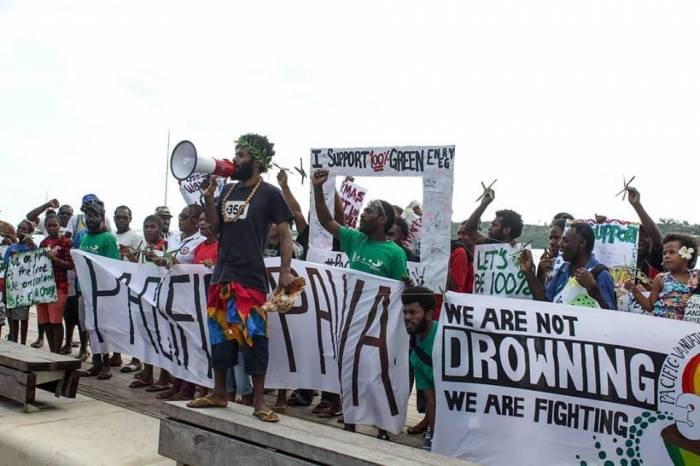I wake up every morning, not to the sound of traffic and factories, but to the sound of birds chirping and the murmuring of a stream in the distance as it flows, continuing to give life to the lush greenery around my home. I can hear my eldest daughter Aiyanna, erupt into a fit of giggles as she helps my wife, Alisi, with breakfast preparations.

My 3-year old son, Ruveni, unsteadily, yet confidently, walks towards the breakfast spread to lay a plate to help set up. It is my role to ensure there is food to nourish our bodies, and our minds, whether it be from our backyard garden, or the markets. We all have a role to play in ensuring that my family thrives.
“This is how I was raised, to envision humanity to be when it comes to striking a balance between development and nature – we all have a role to play to ensure we do our part to keep the planet thriving.”
The Climate Crisis
In more recent years, things have changed dramatically, where we can no longer control how nature responds to our nurturing methods to ensure there is abundance. There have been prolonged droughts, intense cyclones and periods of heavy rainfall – all of which periodically cause destruction to our farms and to our homes.
Growing up in a place where everything we needed was available in abundance from our natural surroundings taught me more than I have learnt in my years of formal education. I learnt to identify traditional medicinal plants from my mother and aunties, the rotation of seasonal crops from my uncle (whom I am named after), and more importantly, what we needed to do to ensure that we have a continuous supply from nature. I was raised as a steward for my surroundings and have always taken this responsibility to heart.
By 2011 this took me on a journey led by science, into a space where I learnt just how interconnected we really are with the rest of the world, and how the actions of more developed nations impact smaller, vulnerable communities like my own. I joined as a volunteer for the Pacific Climate Warriors.
“Soon enough I realised that the climate crisis for which my people were paying for, was not caused by our actions.”
It was caused by the fossil fuel industry, which to date, continues to spew out toxic greenhouse gases into the atmosphere, directly contributing to global warming and the climate crisis, and choking our existence. This was a battle I could not fight alone, and I knew there were others like me, who wanted to see an end to what was killing not just the Pacific, but the rest of the planet.

One of my journeys took me to Horseshoe Beach, Newcastle, where I joined other Pacific Climate Warriors in our traditionally built handmade canoes to blockade the largest coal port in the world. In retrospect, although we weren’t successful in stopping the exportation of destruction to the Pacific, we managed to demonstrate that the people of the Pacific are not going to easily give up the fight in the climate crisis – we are not drowning, we are fighting.
Being a Pacific Climate Warrior for the last 9 years, and now working as 350.org’s Pacific Organizer, has provided me more insight into what effective stewardship and climate action looks like. It can take the shape of mobilising your community offline (when we had the luxury of physical gatherings), it can also take the shape of a concept note to run a series of online trainings to develop the skills of the next wave of climate activists. It can also take the shape of talanoa, a highly valued tradition for Pacific Island people, which has now taken on a new dimension as we maneuver the COVID-19 pandemic and transition from in-person to online storytelling, and in both instances we can continue to be socially connected.
I’ve had to unlearn and learn, to adapt my stewardship to respond to the current state of the planet, and my mission stays the same: to protect my vanua and contribute to providing abundance for my family.
“I cannot allow the fossil fuel industry to rob me of my cultural identity and ability to provide for my family with dignity, through the loss of land and ocean.”
For years, through this journey, science has called for just transitions away from fossil fuel use to renewable energy. The science has shown the potential impacts and what we stand to lose and how much worse droughts, floods, and cyclones can get. The political will to make these changes has lacked sorely, and the reality that we are all part of an intricate ecosystem where humans and nature rely on each other to thrive, has been lost.
COVID-19 and Climate Action
In an unprecedented turn of events, the COVID-19 pandemic has placed restrictions on the movement of people and the operations of industries that have for so long hurt our mother earth. To reach a state of global pandemic to then be able to see that humanity has the ability to make the drastic changes needed to allow the planet to heal is terrifying.

I would never have wished for this to be the example to show that our unrelenting consumption of resources needs to be drastically reduced, so we can once again live in harmony with our intricate ecosystem, our mother earth. Yet, we see what is before us and are now in a position to ask ourselves, do we want to go ‘back to normal?’ Or create a new world that not only protects and nourishes humanity to thrive, but does so in a way that protects our mother earth too.
All the same, each one of us is critical to maintaining the balance in nature by taking climate action.
“We need to make responsible choices when it comes to the companies we support, the products we buy and the activities we carry out daily.”
The best place to start is by learning more about the science behind the climate crisis and the responsibility that we all have in addressing the issue. The first step you can take is to support the Pacific Climate Warriors by following their social media accounts, Facebook and Instagram, and find out how they are rising against the climate crisis. The next step would be to join one of their organised activities, which will be shared on their social media channels.
We need to be better stewards, not just for our own needs, but for the communities we exist in, because it is more evident now, than ever before, just how connected we all are – to each other, and to our planet.